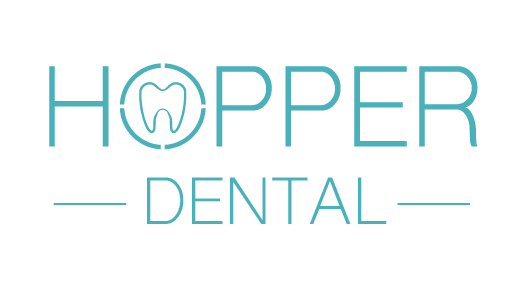
Jenks Dentist FAQ
Many patients at Hopper Dental come into our Jenks dentist office with questions about their services. We are always happy to provide further information regarding a dentistry service, hygiene technique, or dentistry in general. However, here are a few of the most (FAQ) frequently asked questions when it comes to dental care.
How often should I visit the dentist?
Dentists everywhere agree that you should visit the dentist once every six months for a routine dental exam and cleaning. There are many reasons why a bi-annual checkup is crucial to not only your oral health but also the overall health of your body.
During your bi-annual dental exam and cleaning, the dental team will thoroughly clean every surface of your tooth. This is important as it is nearly impossible to completely clean your own teeth using at-home tools and techniques.
Additionally, your dental exam is an opportunity for your dentist to inspect every surface of both your teeth and your gums. In doing so, they are able to help treat and prevent more involved dental procedures from occurring.
Are regular dental exams important for adults?
As we age, our schedules get busier. We tend to think that once we reach maturity, regular dental exams are no longer necessary. Since we deem them unnecessary, these important visits fail to make their way into our schedule. Routine dental cleanings and exams are just as important for adults as they are for children and adolescents.
Although adults are facing different oral health issues than children, they are still things that should be under the oversight of a dental professional. During your dental exam, your dentist will be able to assess your risk for oral cancers, tooth decay, gum disease, and a myriad of other ailments.
Additionally, your mouth can be very helpful in providing warning signs for other issues with your overall health that are occurring under the surface. Because of this fact, it is important to maintain your bi-annual appointment with your local dentist, even after reaching adulthood.
What happens during a cleaning appointment?
A dental exam and cleaning appointment is a routine service offered by any general dentistry practice. This exam should occur twice each year, approximately every six months. Upon arriving at the practice, you will fill out some basic paperwork.
Once you are called back into the treatment area, a dental hygienist will proceed to clean each and every surface of your teeth. During this time, they will also make a note of any potential problems they observe during the cleaning.
After your teeth have been cleaned, the dentist will conduct a thorough evaluation and examination of your teeth, gums, and the surrounding tissues. This examination is crucial as your dentist will be able to evaluate your risk for tooth decay, gum disease, and even certain types of oral cancer. Early intervention is key to any of these ailments.
Dental exams and teeth cleanings are routine procedures. If your dentist finds a problem that requires additional attention, they will ask you to come back at a later date to receive the service.
Why do I need a dental crown?
Dental crowns and bridges are some of the most common dental procedures outside of routine exams. Your dentist may have recommended this procedure to you! The most common use of dental crowns is to replace or repair a tooth that is compromised in some way. A cap that fits over the existing tooth, dental crowns are used for both cosmetic and functional repairs.
Most often, dental crowns are used to strengthen a tooth that has been damaged by decay or injury of some sort. However, crowns can also be used to correct cosmetic issues such as discoloration, or problems with the tooth’s size and shape.
Although the dental crown procedure is more involved than other dentistry services, it is still a relatively straight-forward procedure. It is important to work with a dentist that specializes in this service to ensure that your dental crown or bridge is both comfortable as well as aesthetically pleasing.
What is the best oral hygiene routine?
Even with bi-annual dental cleanings and exams, your teeth deserve some attention at home. Although your dentist is the best person to suggest a unique hygiene routine for your situation, there are some general guidelines to abide by.
It is important to brush your teeth twice each day. Most dentists recommend brushing once in the morning and again at night before bed. This cleans any excess plaque, bacteria, and food particles which could lead to tooth decay. When you are brushing your teeth, be sure to set a timer for two minutes. This is the ideal time to ensure thorough cleaning of each tooth!
In addition to brushing twice a day, it is important to floss your teeth daily. Daily flossing helps to clean between your teeth, often reaching areas that can not be cleaned by a toothbrush.
Some dentists recommend mouthwash or rinse to eliminate bacteria in hard to reach areas of your mouth. This can be a nice fresh touch to finish your daily oral hygiene routine!
What is the best way to whiten your teeth?
Many factors can cause discoloration of the teeth. Things such as environmental factors, food, drinks like coffee or dark soda, and other elements are frequent culprits. However, luckily for you, there are several alternatives!
Hopper Dental is proud to offer a variety of cosmetic dentistry services including professional teeth whitening. Depending on your unique needs and situation, this can either occur in-office or in the comfort of your own home with the materials we provide.
However, in certain situations, it may be best to pursue dental crowns if only a few teeth require attention. We strive to provide each of our patients with individualized solutions to their oral health concerns.
Can my oral health impact the overall health of my body?
In many ways, your oral health impacts the overall health of your body! Bacteria can enter the bloodstream through your mouth when you fail to clean your teeth using proper hygiene techniques. This includes routine dental exams and cleanings.
Additionally, regular dental cleanings present the perfect opportunity for your dentist to discover any disease symptoms which are impacting the health of your teeth or gums.

